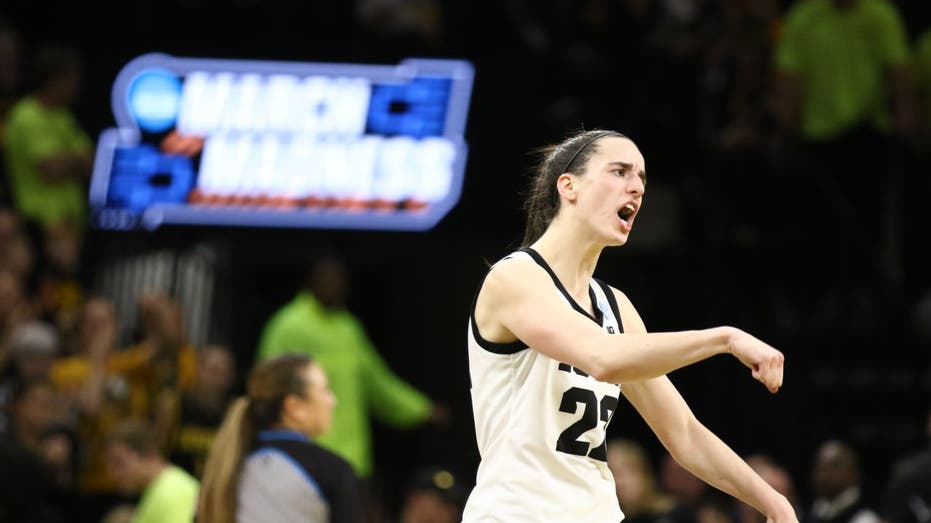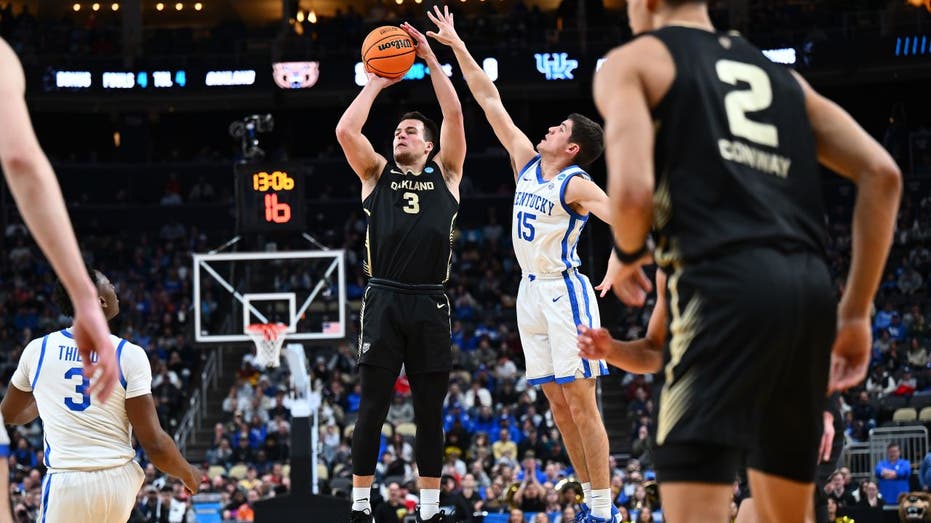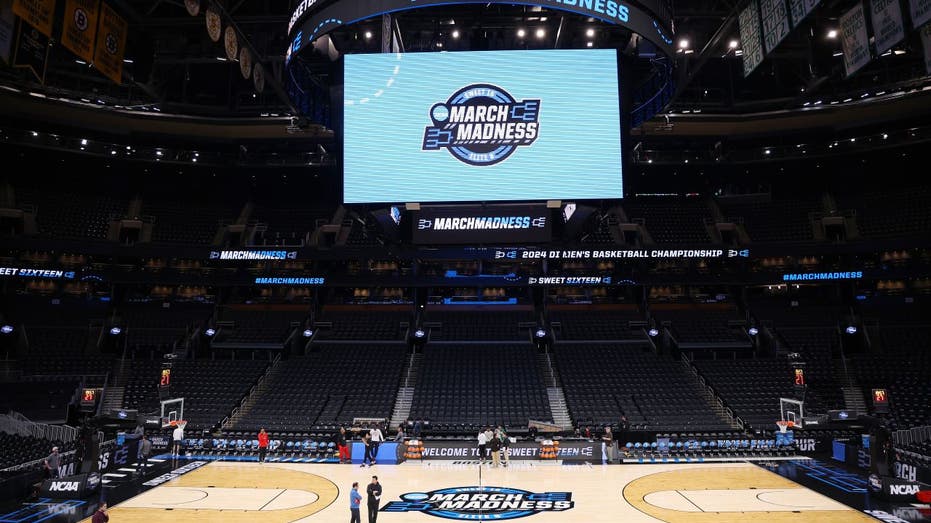March Madness lets athletes boost name, image, and likeness opportunities
The NCAA Tournament offers a big stage for college athletes to compete with their teams and potentially earn NIL deals
Brian Kilmeade on NCAA student-athlete compensation: What is the salary structure?
FOX & Friends co-host Brian Kilmeade discusses New York City Mayor Eric Adams approval ratings amid the migrant crisis and budget cuts as well as an NCAA proposal allowing colleges to pay student-athletes.
March Madness is entering its second week with Sweet 16 and Elite Eight games coming up and student-athletes whose teams are in the field will be on their biggest stage of the season as they look to help their teams advance and potentially find themselves receiving lucrative marketing opportunities at the same time.
A rule changed by the National Collegiate Athletic Association (NCAA) in 2021 allowed college athletes to earn income through licensing their name, image and likeness (NIL) rights to businesses that want to pay them money to do things like appear in advertisements or make social media posts. NIL has in many ways transformed the college sports landscape.
The NCAA Division I basketball tournament is one of the biggest stages in college sports and sponsors have looked to capitalize with NIL deals with some of the sport's biggest stars.
Michael Duffy, managing director, private wealth strategist and head of art planning at Merrill Wealth Management, told FOX Business in an interview that athletes competing on such a big stage "expands their NIL universe immensely" and that the college-affiliated collectives, which can function like a clearinghouse for NIL deals, can see an influx of sponsors as their teams progress.
MARCH MADNESS: NIKE, JORDAN TOP UNDER ARMOUR AND ADIDAS IN NCAA TOURNAMENT FIELD

March Madness attracts millions of viewers and followers around the country and sponsors have looked to capitalize through NIL deals with college basketball stars. (Photo by Joseph Weiser/Icon Sportswire via Getty Images / Getty Images)
In the women's tournament, the Iowa Hawkeyes' Caitlin Clark got a deal with Bose and appeared in an ad for their headphones after she appeared in a Buick ad a year ago around the time of the tournament. Nike, State Farm, Gatorade and other brands have also sponsored Clark through NIL deals over the course of her college career as she has become the all-time leading scorer in Division I.
This year's men's tournament saw the No. 14 seed Oakland Grizzlies pull off a stunning upset of the No. 3 Kentucky Wildcats, the winningest program in college basketball history. Oakland was led by shooting guard Jack Gohlke, a Division II transfer who landed NIL deals with TurboTax and Buffalo Wild Wings, among others, after sinking 10 three pointers in the upset bid.
Duffy explained that it can be challenging for college athletes, who are often influenced by how they see professional athletes acting in terms of their financial habits, to understand that they're at a different stage of their career and should be more cautious about conserving their newfound funds for the future.
MARCH MADNESS: 5 BEST TEAM'S LEFT IN NCAA MEN'S BASKETBALL TOURNAMENT

Caitlin Clark #22 of the Iowa Hawkeyes celebrates late in the second half against the West Virginia Mountaineers during their second round match-up in the 2024 NCAA Division 1 Womens Basketball on March 25, 2024, in Iowa City. (Photo by Matthew Holst/Getty Images / Getty Images)
"It's very hard to teach these amateurs that they're not there yet in their career, that they shouldn't worry about that part of their public image, they should be worrying about their performance and not the clothes they're wearing or the clothes they drive," Duffy said.
He added that convincing a college athlete not to spend their money on a knee jerk purchase and to instead put money away into a retirement plan that they can't withdraw from without penalty in most cases until they're at least 59 and a half years old "can be a difficult conversation but it's so worthwhile – I mean the earlier they can start the better."
IOWA'S CAITLIN CLARK MAKES BOLD STATEMENT AFTER EARLY TOURNAMENT VICTORY
Duffy explained that some NIL beneficiaries haven't taken business courses or may not understand the power of compounding.
"One of the ways to prove it to them is just showing them the numbers: If you start now versus 10 years from now or 20 years from now, this is what it would look like when you're approaching retirement," he said. "And if you can just put this money in, forget about it, and just pretend it's not yours for the next three or four decades you're going to be just fine."
He noted that college athletes receiving NIL funds are self-employed so they can "maybe do a SEP-IRA or some other alternate retirement plan for a sole proprietor or just a single person" that gets them started saving for their future.

Jack Gohlke #3 of the Oakland Golden Grizzlies shoots against Reed Sheppard #15 of the Kentucky Wildcats in the first round of the NCAA Mens Basketball Tournament on March 21, 2024 in Pittsburgh, Pennsylvania. (Photo by Joe Sargent/Getty Images / Getty Images)
With NIL in college sports a relatively new phenomenon, Duffy said that schools and their associated collectives are "putting in a support system now for these college athletes" that can feature "classes and seminars on basic financial management up to how to build a website to enhance your NIL visibility."
"What I am seeing, by the way, is some very successful college athletes remain college athletes for an extra year or two because the money is so good before going on and trying to make the pros somewhere," Duffy said, noting that some NIL deals may be more lucrative for college athletes than a pro contract at the lower end of a league's pay scale.
GET FOX BUSINESS ON THE GO BY CLICKING HERE

The NCAA Division I Tournament – March Madness – offers a large stage for college athletes to perform with their team and raise their visibility for NIL opportunities. (Photo by Michael Reaves/Getty Images / Getty Images)
Duffy added that financial advisors can help college athletes dealing with an influx of income from NIL run interference with what can be extremely difficult requests from family members or friends who are looking to tap into those funds, when it may not be in the long-term financial interest of the athlete to agree to those requests.
"We can run interference, we can provide education. I love to say the your financial advisor can be the one who says no to your friends and family – let them be the bad guy," he said. "I think it's great to have a professional, an adult in the room, who can help try to lead that athlete to a good decision."




















